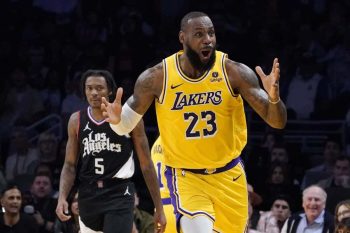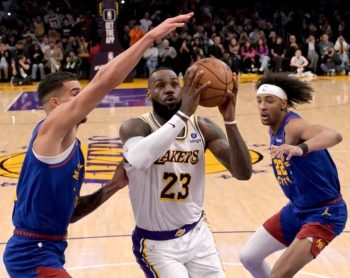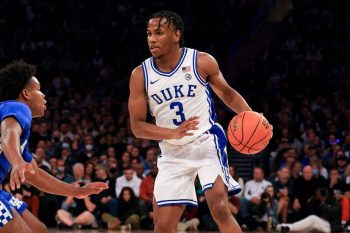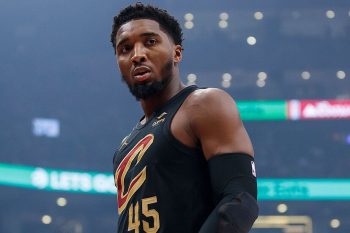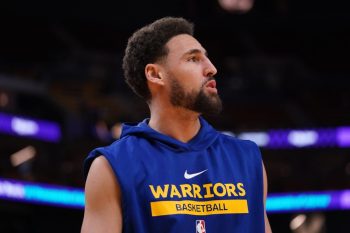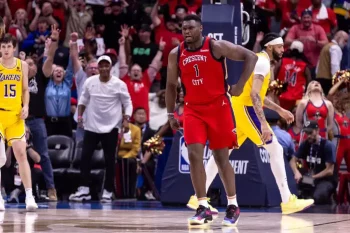NBA
The Long-Term Effects of Going No. 2 in NBA Draft

There are pressures that come along with being the number one overall pick in the NBA Draft. One selection later, there are also expectations for the player picked second. Over the years, there has been a stigma surrounding the number two picks.
In 2003, the Detroit Pistons drafted Darko Milicic No. 2 over Carmelo Anthony, Chris Bosh and Dwyane Wade. In 2005, the Atlanta Hawks chose Marvin Williams two picks ahead of Chris Paul. Michael Beasley went ahead of Russell Westbrook to the Miami HEAT in 2008, and the Memphis Grizzlies drafted Hasheem Thabeet with James Harden available the following year. The list goes on and on.
The debate this year has been between Karl-Anthony Towns and Jahlil Okafor for the top pick. It is a hot topic leading up to the draft and one that will be referenced as they begin their careers.
So how does being the second pick impact a player? How does he deal with the expectations and pressures associated with it? Basketball Insiders spoke to three former second picks to learn more.
Marvin Williams
2005 NBA Draft, Atlanta Hawks
1. Andrew Bogut 2. Marvin Williams 3. Deron Williams 4. Chris Paul 5. Raymond Felton
The 2005 Draft Class was packed with talent, from a handful of title-winning Tar Heels to promising point guards to a big man from Australia.
“The draft was exciting; it was a really fun time,” Williams said. “You take a look at everyone’s career, Deron (Williams) and Chris (Paul) have had amazing careers obviously. I’ve been a fan of theirs from afar. (Andrew) Bogut’s had a great career.”
Williams’ draft stock skyrocketed during the Tar Heels’ championship run. At only 19 years old, he moved ahead of more experienced players in the selection process.
“Some people do, some people don’t (have a stigma of the second pick),” Williams said. “You never know what’s going to happen. The first pick in the draft could be anything, the last pick could be anything. It’s never been anything I’ve put very much emphasis on.
“Any time you’re drafted, I think expectations are always high. There’s never any denying that, in any sport. I think the biggest thing for me is, expectations have never mattered to me. I feel like at the end of the day, I can look at myself in the face and say I gave it everything I’ve had.”
Williams landed on the Hawks, a sub-.500 team at the time. He came off the bench in the beginning of his career and later moved into a starting role. Williams viewed his situation related to his development.
“I think (fit within a team) is everything,” Williams said. “A lot of guys come into situations where they’re able to play 35 minutes a night and they become whatever they become. Other guys that can really play basketball may not be in the same situation. They may be in situation where they have a veteran All-Star in front of them and that guy’s not going anywhere any time soon, so they’ve got to sit back and learn.
“Your situation is everything, but at the same time, as a player and as a person you’ve got to make the best of your situation. I feel like that’s what I’ve had to do every stop of the way in the NBA.”
Now, 10 years later, Williams is a veteran presence on his third NBA team, the Charlotte Hornets. He returned to college and completed his degree as well. At 29, Williams is able to look back with satisfaction at how his career has played out since being drafted.
“At the end of the day, I’m still here,” Williams said. “I’ve done things on the basketball court where I’ve set myself and my family up to be able to support them for the rest of my life, and I think that was the most important thing for me. I’m definitely satisfied with the way my career’s turned out.
“I’m very thankful for being selected where I was selected and proud of my accomplishments. I wouldn’t trade it or change it for the world.”
Derrick Williams
2011 Draft, Minnesota Timberwolves
1. Kyrie Irving 2. Derrick Williams 3. Enes Kanter 4. Tristan Thompson 5. Jonas Valancuinas
When Derrick Williams was in college, he focused on making it to the NBA regardless of where he was selected. But as his stock rose during the NCAA Tournament with the University of Arizona, the buzz surrounding him began to increase.
“It’s crazy because you always have friends like, ‘You see that mock draft? You’re going from 20 to 10 to five.’ I was like, ‘Man, I don’t really care,'” Williams said. “After the (NCAA) Tournament I went up to top three. I said, ‘I don’t really care as long as I make it.’ I think that’s a thing people misinterpret – I didn’t care what number I went. I just wanted to go out there and hoop. Whatever team wanted me at that point, I [was] ready to play.”
Whether Derrick Williams asked for them or not, expectations were high when the Minnesota Timberwolves drafted him second in 2011.
“(The stigma) comes with it,” he said. “Whatever you get drafted, it goes along with you and carries on. I look at guys like Isaiah Thomas, he got drafted 60 and he’s been playing amazing. Some people develop a little slower. I’ve been trying to find my niche since I got into the league. Some things didn’t go as well as I would have wanted them to, especially in Minnesota. Since I’ve been here in Sacramento, it’s been good.”
Williams doesn’t consider a draft pick to be a true reflection of a player’s talent and potential. He sees it related to the organization for which he plays and its current situation.
“I think people look into it a little bit too much – who went five, who went six? It’s a lottery pick, it doesn’t really matter,” he said. “Most of the time, teams are picking you because you’re the best player, not necessarily for what they need. That’s what people need to get – the pick is for who’s the best player, it’s not really for what they need at that point. I really don’t look into it too much.”
Williams struggled to make an impact early on. He averaged 8.8 points and 4.7 rebounds his rookie season on a young team. The Timberwolves traded Williams to the Kings in 2013. Now 24, he is feeling settled in on the West Coast. Looking back now, he can assess his initial struggles.
“I’m out there playing 30-year-old guys and I’m 19, 20 years old trying to prove people wrong,” Williams said. “Sometimes I was trying to do it so much that it actually hurt my game instead of just going with the flow and playing like I know how to. That’s what I did this season, just getting older, playing with different teammates, and having vets. When I was first in Minnesota I didn’t have the vets, the quality of vets to teach me the game like Rudy (Gay) and Reggie (Evans).”
Over the years Williams has received negativity from critics. Instead of focusing on their comments, he looks at how far he has made it from the early stages of his basketball career and keeps his sights set to improvement in the future.
“(People make negative comments), especially on Twitter,” he said. “There have been so many different things, like, ‘You’re a bust.’ I don’t really look into it. I don’t really care. I just go out and play, that’s the main thing. If you’re going to say that, then ok, I’m going to try to drop 20 on you.
“That’s just how I’ve always been. I’ve always been in the underdog role. When I was coming out of high school, I wasn’t on the ESPN 150 and the Rivals top 100 players. I didn’t get invited to the NBA top 100 camp.
“Me getting drafted, that’s a blessing. So I don’t really care what people think. I just try to get better every day and eventually it’ll work out. I know how much work I put in in the offseason and I think a lot of people also know in this locker room. So it’s all going to click. This season, next season, the year after that, I’m going to get better. I know what kind of player I can be and it’s all going to come through.”
Michael Kidd-Gilchrist
2012 Draft, Charlotte Bobcats
1. Anthony Davis 2. Michael Kidd-Gilchrist 3. Bradley Beal 4. Dion Waiters 5. Thomas Robinson
2012 was a whirlwind for Michael Kidd-Gilchrist. He picked up multiple awards, won an NCAA Championship with the University of Kentucky and became a lottery pick — all after his first year in college. By the time the draft rolled around, he was ready to get his NBA career started.
“I couldn’t wait for the process to be over,” Kidd-Gilchrist said. “It was a long process. You’re missing things in the summer time. You’ve got workouts. You’ve got to get an agent, go to the draft combine, it’s crazy.”
Winning a title will bolster a player’s draft stock. In the case of Kidd-Gilchrist, he just wanted to near his name called, period.
“I was just excited,” he said. “If it was two, eight, 11, 25, I didn’t really care. It was a dream come true for me and my family.”
Kidd-Gilchrist was drafted second by the then-Bobcats, who were coming off a 7-59 season. The team went 21-61 in his rookie year, and made a turnaround his sophomore season to reach the playoffs.
“That’s not really our choice to pick the team; you’ve got to make the best out of it,” he said. “You have to learn every day you’re on the roster.”
The 21-year-old doesn’t believe his pick number determined his potential. There have been success stories from across the draft board, from an MVP candidate to NBA champions.
“There are a lot of great players that went number two, a lot,” he said. “And a lot that went number one, number five, six, seven, eight, nine, 10. There’s a lot of great players that come through the draft. I think it’s a great talent in our class. Anthony (Davis), Brad (Beal), Harrison Barnes, even Draymond Green was a low pick.”
Kidd-Gilchrist approaches his career as being an NBA player, not a former second pick. To him, the expectations come on the court instead of the selection order.
“I don’t believe in pressures,” he said. “I’ve been playing this game my whole life and that’s how I feel. I always like having fun on the court. I don’t really care about stats. I just want to win basketball games.”
